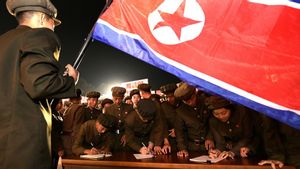JAKARTA - The House of Representatives (DPR) asked Pertamina and the State Gas Company (PGN) to maintain their performance amidst the sluggish world oil and gas (oil and gas) industry. This is because several government policies have encouraged State-Owned Enterprises (BUMN) to cut their business margins.
One of them is the policy of a certain industrial gas price of 6 US dollars (US) per million metric British thermal unit (MMBTU) at the plant gate as stated in the Ministerial Regulation (Permen) of Energy and Mineral Resources (ESDM) Number 8 of 2020.
Member of Commission VII Falah Amru admitted that he was worried that the policy that cut PGN's business would reduce the BUMN's ability to develop natural gas infrastructure in the country.
"We ask to explain the impact of this policy (Permen ESDM No. 8/2020) on PGN's ability to build infrastructure. We don't want PGN to lose, because the people also lose," said Falah, during the Commission VII hearing (RDP) with Pertamina and PGN, Tuesday, April 21.
Likewise, Commission VII member Tifatul Sembiring also encouraged an evaluation of Permen No. 8 of 2020 which was just released last week. Tifatul indicated that the new regulation could cut PGN's role in expanding the use of natural gas.
Tifatul argued that the Ministerial Regulation which was a derivative of Presidential Decree No. 40 of 2016 concerning natural gas pricing for certain industries will in fact open the door for the private sector to play a bigger role in the natural gas industry chain.
"There should be no flirting. So there must be consultation with the ministry (ESDM) about the regulation," he explained.
In response to this, PGN President Director Gigih Prakoso explained, PGN will propose several incentive options to the Ministry of Energy and Mineral Resources regarding the implementation of this particular industrial gas price policy.
- https://voi.id/artikel/baca/4784/penyektronik-harga-gas-industri-dinilai-katrol-produktivity-sektor-man Manufacturing-dalam-negeri
- https://voi.id/artikel/baca/4833/komisi-vi-dpr-dorong-alu-permen-esdm-terkait-harga-gas-industri
- https://voi.id/artikel/baca/3256/pengamat-usulkan-penunan-harga-gas-industri-harus-diimbangi-penambahan-pajak
[/ see-also]
Gigih revealed that several options could be carried out through the application of a special price purchased by PGN from suppliers. The volume of gas at this special price will be sold to PGN's customers, both industrial customers who are included in Keppres No. 40, or those outside Keppres No. 40.
However, Gigih said, if the demand condition is still decreasing and PGN cannot sell, then another alternative is for companies to propose a cash reimbursement from the government.
"We will convey all of this to the government to seek approval," he said.
Previously, at the meeting, Gigih stated that the existence of the Minister of Energy and Mineral Resources No. 08 made PGN's gas selling price to the industry drop. The impact is that the company's revenue will also decrease.
According to Gigih, currently PGN's gas price to the industry averages US $ 8.4 per MMBTU. Thus, with a certain industrial gas price set at US $ 6 per mmbtu, PGN will lose revenue of US $ 2.4 per MMBTU.
Furthermore, Gigih revealed, according to the provisions of Permen 08, the gas price in the upstream area will also be reduced to around US $ 4 to US $ 4.5 per mmbtu. Meanwhile, PGN has been buying upstream gas prices by an average of around US $ 5.4 per MMBTU.
"So there is still a difference between the reduction in gas prices in the upstream area and the selling price of PGN's gas to the industry. We will report it to the Minister of BUMN to get incentives," he said.
Meanwhile, PGN's Finance Director Arie Nobelta Kaban said, if there are no incentives, then PGN's ability to meet its long-term obligations will likely be disrupted. According to Arie, the implementation of Permen ESDM Number 08 of 2020 will have an impact on company revenue which is estimated to fall by 21 percent, if there is no incentive from the government.
"Currently, PGN has long-term debt obligations of US $ 1.95 billion which will mature in 2024. If the revenue is disrupted it will make PGN unable to fulfill its obligations," said Arie.
The English, Chinese, Japanese, Arabic, and French versions are automatically generated by the AI. So there may still be inaccuracies in translating, please always see Indonesian as our main language. (system supported by DigitalSiber.id)












